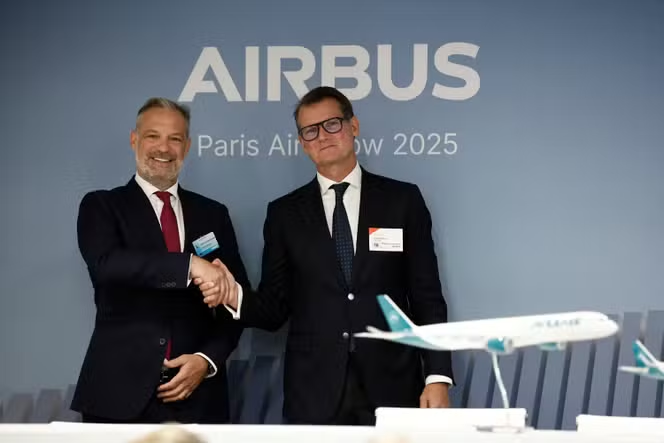Saudi Arabia’s rapidly growing aircraft leasing company, AviLease, made global headlines this week after announcing a landmark deal with Airbus at the 2025 Paris Air Show. The company revealed plans to purchase 77 aircraft, a move that sends a strong signal about Saudi Arabia’s ambitious push to become a major player in the global aviation sector.
This multi-billion-dollar agreement marks AviLease’s first direct order from the European plane manufacturer and is considered one of the most significant transactions unveiled at the air show. For a company that was only established a few years ago, this bold step represents a major leap in global visibility, scale, and influence.
Inside the Deal
The order comprises 30 A320neo family jets and 10 A350 freighter aircraft, two of Airbus’s most advanced and in-demand models. Alongside these firm orders, AviLease has secured purchase rights for an additional 37 A320neos and 12 A350Fs, bringing the potential total to 77 aircraft.

The A320neo jets are known for their fuel efficiency, making them ideal for high-frequency, short-to-medium haul routes. Meanwhile, the A350F offers world-class cargo capabilities with significantly lower carbon emissions than older widebody freighters.
AviLease’s decision to include both passenger and cargo aircraft signals a smart diversification strategy. It allows the company to meet the growing needs of airlines looking to modernize their fleets and logistics companies requiring high-capacity, fuel-efficient cargo solutions.
Deliveries are expected to take place between 2030 and 2033, aligning with Saudi Arabia’s aviation expansion plans under its national development framework, Vision 2030.
A Bold Strategic Move
AviLease’s announcement at the Paris Air Show wasn’t just about placing a big order. It was a calculated move to position itself as a serious contender in a competitive global market dominated by long-established leasing giants based in Ireland, the U.S., and China.
The Paris Air Show, the industry’s largest and most watched event, was the perfect platform for this declaration of intent. With thousands of global aviation stakeholders in attendance — from airline CEOs to investment firms and manufacturing partners — AviLease’s reveal was not only high-profile but perfectly timed.

By securing a large volume of next-generation aircraft, AviLease is building the inventory required to offer competitive lease packages to both regional and international carriers. This gives the company a foothold in various market segments, from budget airlines operating regional routes to international carriers expanding global cargo operations.
A Key Player in Vision 2030
AviLease is more than a leasing company. It is a key piece of Saudi Arabia’s broader economic transformation strategy. Vision 2030, the national roadmap for diversifying the Saudi economy away from oil, identifies aviation as one of its strategic pillars.
Part of that vision includes turning the Kingdom into a global logistics and air transit hub. That means not just building new airports or launching national carriers like Riyadh Air, but also creating infrastructure and institutions that support the aviation industry — including aircraft leasing.
AviLease was established in 2022 with this purpose in mind. Backed by the Saudi Public Investment Fund (PIF), one of the largest sovereign wealth funds in the world, the company is tasked with accelerating the development of Saudi Arabia’s aviation ecosystem.
This new deal with Airbus allows AviLease to scale quickly and offer competitive leasing solutions at a time when demand for newer, more efficient aircraft is rising. It also ensures that Saudi-based airlines have a steady pipeline of aircraft as they expand.
Why Airbus?
The decision to partner with Airbus reflects market trends as well as practical considerations. Airbus’s A320neo family is currently the most in-demand single-aisle aircraft in the world, offering lower fuel consumption and emissions — benefits that are increasingly important to airlines under pressure to meet environmental targets.
On the freighter side, the A350F is quickly becoming a favorite among cargo operators for its range, fuel efficiency, and payload capacity. With global cargo demand still elevated due to e-commerce and supply chain shifts, AviLease’s inclusion of these aircraft positions it to meet one of the fastest-growing segments in aviation.
Airbus has also been far more stable in recent years compared to its American rival Boeing, which continues to grapple with production delays and safety controversies. The reliability of Airbus’s production timelines likely made it a safer bet for a company looking to scale up on a deadline.
Global Industry Impact
This order is not just a big moment for AviLease or Airbus — it has broad implications for the entire industry.
First, it further underscores the growing importance of the Middle East in global aviation. Once considered just a stopover region for long-haul routes, the Gulf has now become a center of growth and investment in both passenger and cargo operations. Between carriers like Emirates, Qatar Airways, and new players like Riyadh Air, and lessors like AviLease, the region is now setting trends rather than following them.
Second, it reflects how aircraft leasing is evolving. As more airlines seek asset-light business models, leasing has become a more dominant way to acquire fleets. Lessors now play an essential role in shaping global airline capacity, and AviLease’s growth adds fresh competition to a market historically led by Western firms.
Third, it contributes to the momentum toward greener aviation. Both aircraft types in the AviLease order are designed with fuel burn and emissions reduction in mind. As global regulators and passengers push for more sustainable flying, demand for these types of aircraft will only increase.
What’s Next for AviLease?
With this landmark order now public, attention turns to execution. AviLease will need to build out its internal capacity — from sales and marketing to maintenance oversight and customer support — to manage such a significant fleet.

Partnerships with local and international carriers will also be critical. While Saudi-based airlines will be obvious customers, AviLease’s true growth potential lies in serving clients across Asia, Africa, and Europe — regions that are forecasted to see rapid aviation growth in the coming decade.
The company’s leadership has indicated that more deals could follow, possibly with other manufacturers or for different aircraft types such as regional jets or electric-powered planes. This would align with broader market trends and further diversify AviLease’s portfolio.
Final Thoughts
AviLease’s 77-jet deal with Airbus is more than a headline-making announcement. It’s a strategic declaration that Saudi Arabia is not only investing in aviation — it’s aiming to lead.
Backed by the financial might of the Public Investment Fund and guided by a clear national vision, AviLease is on track to become a global force in aircraft leasing. This latest move gives it the aircraft, the credibility, and the momentum to compete with the best in the world.
And for Airbus, it’s yet another validation that its aircraft — and its strategy — are perfectly aligned with the needs of tomorrow’s aviation leaders.
In an industry where timing, vision, and execution are everything, AviLease has just proven it’s ready for takeoff.
Do follow UAE Stories on Instagram
Read More: Eagle Hills Joins Glamorous $215M Venice Hotel Transformation













